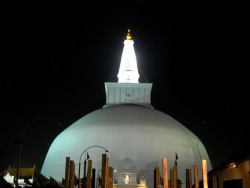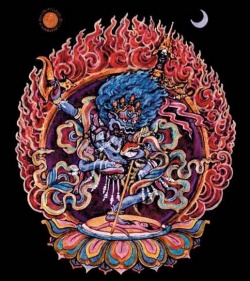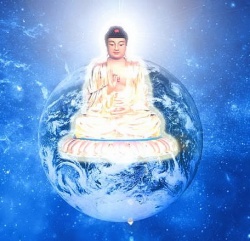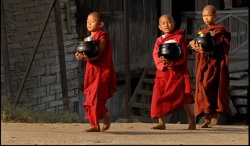Difference between revisions of "Lay Sangha"
(Created page with " The So-Called Lay "Sangha" in America by Ronald Epstein (Upasaka I Guorong) Originally published in Vajra Bodhi Sea, v. 16, ser. 38, no. 188, Jan. 1...") |
|||
| Line 1: | Line 1: | ||
| + | <nomobile>{{DisplayImages|3458|925|935|532|215}}</nomobile> | ||
| Line 4: | Line 5: | ||
| − | The So-Called | + | |
| + | The So-Called [[Lay Sangha]] in [[America]] | ||
by [[Ronald Epstein]] ([[Upasaka]] I Guorong) | by [[Ronald Epstein]] ([[Upasaka]] I Guorong) | ||
| Line 12: | Line 14: | ||
({{Wiki|Chinese}} translation published in Wan-fo Ch'eng, Sept. 1985, p. 18.) | ({{Wiki|Chinese}} translation published in Wan-fo Ch'eng, Sept. 1985, p. 18.) | ||
| − | Many of [[America's]] new [[Buddhists]] are spreading the [[idea]] that they are a "[[sangha]]" and that their lay "[[sangha]]" {{Wiki|movement}} is the correct [[adaptation]] of [[Buddhism]] to the [[American]] scene. Where does this peculiar and [[dangerous]] [[idea]] come from? | + | Many of [[America's]] new [[Buddhists]] are spreading the [[idea]] that they are a "[[sangha]]" and that their lay "[[sangha]]" {{Wiki|movement}} is the correct [[adaptation]] of [[Buddhism]] to the [[American]] scene. |
| + | |||
| + | Where does this peculiar and [[dangerous]] [[idea]] come from? | ||
| + | |||
| + | [[Traditionally]] the [[Sangha]] is considered the third of the [[Three Jewels]]---[[Buddha]], [[Dharma]], and [[Sangha]] --which are the foundation of [[Buddhism]]. | ||
| + | |||
| + | [[Sangha]] refers to the {{Wiki|community}} of [[fully ordained monks]] ([[Bhikshus]]) and [[nuns]] ([[Bhikshunis]]) who de-vote their [[lives]], full-time, to the [[Buddhist Path]]. | ||
| + | |||
| + | In both [[Northern]] ([[Mahayana]]) and Southern ([[Theravada]]) [[Buddhism]], the [[moral]] relations governing the [[life]] of the | ||
| + | |||
| + | [[Sangha]] {{Wiki|community}} are practically [[identical]]. | ||
| + | |||
| + | They insure a [[lifestyle]] that is [[pure]], [[celibate]], and free from [[worldly]] [[desires]]. | ||
| + | |||
| + | In both [[Northern]] and [[Southern Buddhism]], the great [[teachers]] and enlight-ened [[masters]] have come almost exclusively from the [[Sangha]]. | ||
| + | |||
| + | There have been a few [[enlightened]] [[Buddhist]] [[laymen]] and [[laywomen]] in the {{Wiki|past}}, but not one of them failed to wholeheartedly support the [[Sangha]] as the foundation of the larger [[Buddhist community]]. | ||
| + | |||
| + | How can [[laypeople]] constitute a "[[sangha]]"? | ||
| + | |||
| + | This is a case of a little [[knowledge]] being a [[dangerous]] thing. | ||
| + | |||
| + | They hear that the [[Sanskrit]] [[word]] [[sangha]] means {{Wiki|community}} and say to themselves: we are a {{Wiki|community}}, so we should call ourselves "[[sangha]]." | ||
| + | |||
| + | Why do they ignore the [[traditional]] meaning of [[Sangha]] within [[Buddhism]]? | ||
| + | |||
| + | Why do they try to usurp the roles of the [[monks and nuns]] without taking on their commitment, [[vows]], and responsibilities? | ||
| + | |||
| + | This is a case of an initially valid [[insight]] leading to wrong conclusions because of lack of correct [[information]]. | ||
| + | |||
| + | Most of those in the lay "[[sangha]]" {{Wiki|movement}} were introduced to [[Buddhism]] through [[American]] [[Zen Centers]] that see themselves in the [[tradition]] of the [[Japanese Zen]] schools, which belong to [[Northern]], [[Mahayana]], [[Buddhism]]. | ||
| + | |||
| + | They see that the [[teachers]] in those schools, both [[Japanese]] and [[American]], are [[married]] and in many cases lead [[lives]] that are far from being [[austere]] and [[pure]]. | ||
| + | |||
| + | It strikes them that there is no [[reason]] for them to support these so-called "{{Wiki|priests}}" or "[[monks]]" whose way of [[life]] is not really {{Wiki|superior}} or more laudable than their [[own]]. | ||
| + | |||
| + | That makes [[sense]]. | ||
| + | |||
| + | But then, instead of supporting a real [[Sangha]], they set them-selves up as "[[sangha]]." | ||
| + | |||
| + | They don't realize that their [[own]] [[Japanese Zen]] [[tradition]] was derived from {{Wiki|Chinese}} [[Ch'an]] ([[Zen]] being the [[Japanese]] pronunciation) and that the [[lineages of Chinese Ch'an]] are traced back to [[India]] and ultimately to the [[Buddha]]. | ||
| + | |||
| + | They don't know that all the great [[Japanese Zen]] [[masters]] strongly supported the [[monastic traditions]] as they existed in [[India]] and [[China]] as being absolutely [[essential]] to the survival of the [[Japanese Zen tradition]]. | ||
| + | |||
| + | They don't realize that it was only in 1868, a little over a hundred years ago, that the [[Japanese]] government closed all [[Buddhist monasteries]] and sent all the [[monks and nuns]] back to lay [[life]]. | ||
| − | [[ | + | The [[reason]] for abolishing the real [[Sangha]] in [[Japan]] was {{Wiki|political}}, and no one in [[Japan]] has ever tried to justify it on [[religious]] grounds. |
| − | + | The [[Sangha]] was simply never reestablished there. | |
| − | + | Most of the [[people]] in the lay "[[sangha]]" {{Wiki|movement}} are well-meaning, [[thinking]] that they are building a truly [[American Buddhism]]. Unfortunately, they are unaware that, throughout history, wherever the [[Sangha]] has been strong and [[pure]], [[Buddhism]] has flourished, and wherever the [[Sangha]] is weakened and corrupt, [[Buddhism]] decays. | |
| − | + | By setting themselves up as "[[sangha]]," instead of encouraging, aiding, and supporting the real [[Sangha]], they are not only failing to help build [[American Buddhism]], but are directly opposing and undermining it. | |
| − | + | These well-meaning [[people]] should educate themselves about their [[own]] [[traditions]], so that they can understand the harm they are doing, change their ways, and enter the [[right Path]]. | |
{{R}} | {{R}} | ||
http://online.sfsu.edu/rone/Buddhism/laysangha.htm | http://online.sfsu.edu/rone/Buddhism/laysangha.htm | ||
[[Category:Lay Sangha]] | [[Category:Lay Sangha]] | ||
Latest revision as of 18:39, 16 March 2016
The So-Called Lay Sangha in America
by Ronald Epstein (Upasaka I Guorong)
Originally published in Vajra Bodhi Sea, v. 16, ser. 38, no. 188, Jan. 1986, p. 18.
(Chinese translation published in Wan-fo Ch'eng, Sept. 1985, p. 18.)
Many of America's new Buddhists are spreading the idea that they are a "sangha" and that their lay "sangha" movement is the correct adaptation of Buddhism to the American scene.
Where does this peculiar and dangerous idea come from?
Traditionally the Sangha is considered the third of the Three Jewels---Buddha, Dharma, and Sangha --which are the foundation of Buddhism.
Sangha refers to the community of fully ordained monks (Bhikshus) and nuns (Bhikshunis) who de-vote their lives, full-time, to the Buddhist Path.
In both Northern (Mahayana) and Southern (Theravada) Buddhism, the moral relations governing the life of the
Sangha community are practically identical.
They insure a lifestyle that is pure, celibate, and free from worldly desires.
In both Northern and Southern Buddhism, the great teachers and enlight-ened masters have come almost exclusively from the Sangha.
There have been a few enlightened Buddhist laymen and laywomen in the past, but not one of them failed to wholeheartedly support the Sangha as the foundation of the larger Buddhist community.
How can laypeople constitute a "sangha"?
This is a case of a little knowledge being a dangerous thing.
They hear that the Sanskrit word sangha means community and say to themselves: we are a community, so we should call ourselves "sangha."
Why do they ignore the traditional meaning of Sangha within Buddhism?
Why do they try to usurp the roles of the monks and nuns without taking on their commitment, vows, and responsibilities?
This is a case of an initially valid insight leading to wrong conclusions because of lack of correct information.
Most of those in the lay "sangha" movement were introduced to Buddhism through American Zen Centers that see themselves in the tradition of the Japanese Zen schools, which belong to Northern, Mahayana, Buddhism.
They see that the teachers in those schools, both Japanese and American, are married and in many cases lead lives that are far from being austere and pure.
It strikes them that there is no reason for them to support these so-called "priests" or "monks" whose way of life is not really superior or more laudable than their own.
That makes sense.
But then, instead of supporting a real Sangha, they set them-selves up as "sangha."
They don't realize that their own Japanese Zen tradition was derived from Chinese Ch'an (Zen being the Japanese pronunciation) and that the lineages of Chinese Ch'an are traced back to India and ultimately to the Buddha.
They don't know that all the great Japanese Zen masters strongly supported the monastic traditions as they existed in India and China as being absolutely essential to the survival of the Japanese Zen tradition.
They don't realize that it was only in 1868, a little over a hundred years ago, that the Japanese government closed all Buddhist monasteries and sent all the monks and nuns back to lay life.
The reason for abolishing the real Sangha in Japan was political, and no one in Japan has ever tried to justify it on religious grounds.
The Sangha was simply never reestablished there.
Most of the people in the lay "sangha" movement are well-meaning, thinking that they are building a truly American Buddhism. Unfortunately, they are unaware that, throughout history, wherever the Sangha has been strong and pure, Buddhism has flourished, and wherever the Sangha is weakened and corrupt, Buddhism decays.
By setting themselves up as "sangha," instead of encouraging, aiding, and supporting the real Sangha, they are not only failing to help build American Buddhism, but are directly opposing and undermining it.
These well-meaning people should educate themselves about their own traditions, so that they can understand the harm they are doing, change their ways, and enter the right Path.




